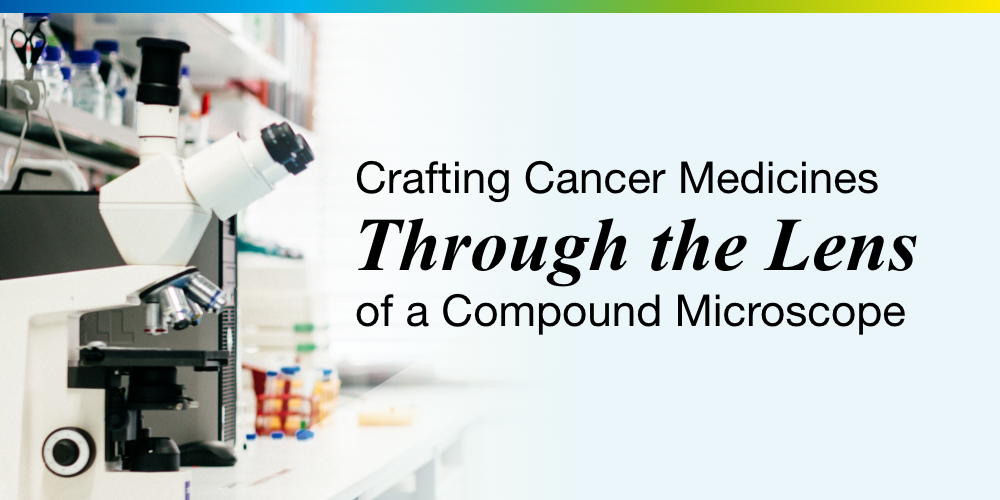
When recently asked to reveal his favorite piece of lab equipment, Mark Rutstein, MD, named the basic compound microscope because of its magnification powers that can be used throughout the scientific process.
“It provides a metaphor for what we must do to discover and develop new cancer medicines,” said Mark. “While it’s important to use high magnification to elucidate cellular pathways to better understand the biology behind a disease, it’s also critical to have the ability to ‘zoom out’ at times in order to counterbalance this detailed knowledge and better understand where it fits in the context of a broader strategic paradigm.”
- Mark Rutstein, MD, Senior Vice President, Global Head Oncology Clinical Development
Switching between high and low magnification is the approach Mark has followed throughout his life and career, bringing him to where he is today, currently serving as the Global Head of Oncology Clinical Development at Daiichi Sankyo.
Offering a Helping Hand with Humanity
Mark always knew he wanted to help people. Upon entering college, he thought this would be through the law, so he initially focused on pre-law during his undergraduate studies at Columbia University in New York City. However, during his junior year, following a transformational visit with his sister who was training in surgical oncology at medical school, Mark decided he wanted to explore medicine as a career, and looked into volunteer opportunities at local hospitals in Harlem to uncover more.
“I discovered a nice match when I was in emergency rooms or intensive care units, helping out in any way possible to help sick people,” said Mark. “It really drew me to the idea that if I’m going to work hard, I should focus on a career where I can extend a helping hand to human beings, and it turns out this was medicine.”
Following completion of medical school at the University of Massachusetts, Mark continued with a residency in internal medicine at Brigham and Women’s Hospital in Boston where he gained extensive experience treating patients with cancer who were admitted from the Dana Farber Cancer Center. While considering a fellowship in nephrology, once again other interests – including healthcare systems and healthcare finance – shifted his focus to investigate a different facet of medicine. Mark decided to attend Cornell University to study business while also working as an intensive care doctor at a local hospital.
“As I was exposed to macro- and micro-economics, financial statement analysis, finance, and all the disciplines of business, I began to realize that there was an intersection and synergy between what I knew about clinical medicine and patient care, and what I was learning about the business world,” said Mark.
This intersection brought Mark to the pharmaceutical industry.
Helping More People Through the Intersection of Medicine and Business
Entering the pharmaceutical industry in medical affairs at Amgen, Mark quickly learned the ropes and made the transition to oncology clinical development with roles of increasing responsibility at additional companies including ImClone/Eli Lilly, Bayer and Bristol-Myers Squibb. “Drug development as a concept made a lot of sense to me. As a physician, I enjoyed helping individual patients, and by extension their families,” said Mark. “I could see there was an opportunity to potentially help hundreds of thousands of patients through developing innovative medicines, so I believed this was my opportunity to help impact the lives of patients on even a larger scale.”
Now, Mark oversees global clinical development of the oncology medicine portfolio at Daiichi Sankyo and is enthusiastic about the depth of the company’s current and future pipeline as well its vision to create new standards of care for patients with cancer. “Drug development is a team sport, so when you think about what is required for Daiichi Sankyo to potentially deliver this pipeline, building cross-functional partnerships and capabilities as well as focusing on a ‘one’ team approach with a clear vision is critical,” said Mark.
And, it’s always important not to forget to examine things at both high and low magnification to help push the boundaries of science.
Suggestions
My decision to devote my career to oncology is deeply personal. During my senior year in college, my father was diagnosed with cholangiocarcinoma, or bile duct cancer. As one of his caregivers…
Not all breast cancers are the same. This is particularly true about metastatic breast cancer versus early-stage breast cancer in terms of how the disease spreads, its prognosis, treatment options, and even the patient journey.
Business development is the craft of making connections. Whether with other companies or within our organization, we need to build those bonds that allow us to be successful.